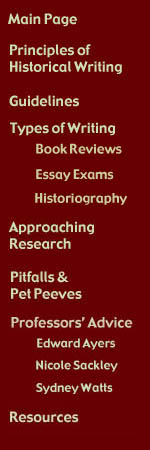

Interview with Sydney Watts, Ph.D.
- Not answering the specific question being asked
- Offering generalities and platitudes, saying very big, broad statements
- Narration or description without analysis
- Not using primary and secondary sources to understand change over time
Common Mistakes History Professors See in Student Writing
Key Points:
"If you find yourself just describing events instead of asking yourself why they happened or how they happened, you're probably on the wrong track."
- Be careful of using too much description instead of analysis.
- Historians do use biographical descriptions, but there is always analysis answering WHY? and HOW?
Writing for History
Key Points:
- History is different from other disciplines because it uses both primary and secondary sources.
- A primary source must be put into context by thinking about things such as:
- how it was produced
- who the audience was
- how the author intended the document to be read
- what kind of document it is (public, private, another kind?)
- Ask yourself: "How does this fit into the bigger picture?"
Tips for Beginning Students
Key Points:
"Historical writing really begins with the questions you're asking of your sources."
- Have a good research question in mind.
- Give yourself enough time to read through your sources.
- Look out for specific terms in your sources that are important to the subject you're writing about, and define those terms by thinking about how they were used in the period that you're writing about.
History Professor "Pet Peeves"
Key Points:
- Again, have an argument, also known as your thesis, and put that argument in your introduction.
- Outline your main points in your first paragraph.
- Professors don't like to see mistakes concerning spelling, capitalization, punctuation, or any other structural mistakes. Proofread your paper!
- Reading your paper aloud can really help you when proofreading your paper yourself.
Thinking Like a Historian & Historiography
Key Points:
"Thinking like a historian is definitely a skill that you want to build early on."
- Look at the works of historians that you study, and try to see how they work with their own set of questions. Doing this will help you to develop your own sets of questions when writing your paper.
- Consider your primary sources to build an argument of your own. Don't be afraid to have your own interpretation.
- When writing historiography, take into account the different interpretations, points of view, traditions, and revisions of history that you see.
- Look for your own way to approach the sources that you have to construct your own interpretation of historical events.
Resources:
If you would like to see the full transcript of Dr. Watts' interview, click here.
Other Disciplines | Writer's Web | Writing Center | Make an Appointment
| Library | History Department
Copyright Info